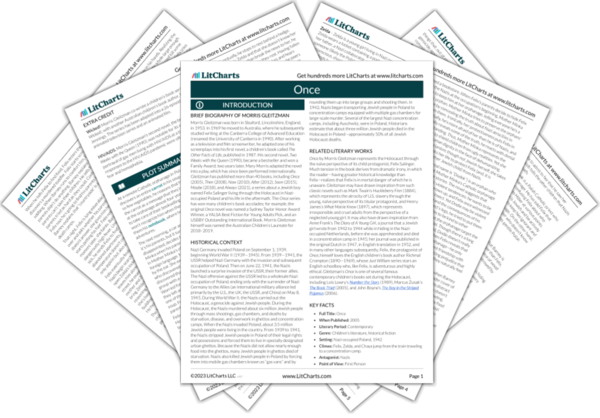Storytelling
In Once, storytelling blinds people to danger—but it also protects them, helps them endure pain, and gives them courage, which ultimately makes it a force for good. The novel’s protagonist, Felix, is a young, story-loving Jewish boy living in Nazi-occupied Poland during the Holocaust. His parents left him at a Catholic orphanage, telling him that they needed to fix problems with their bookselling business but would return. By blinding Felix to Nazi persecution…
read analysis of StorytellingInnocence and Ignorance
In Once, adults try to preserve children’s innocence by hiding terrible truths from them. Yet in doing so, they also make children ignorant, which exposes them to danger. The novel’s protagonist, Felix, is a Jewish boy living in Nazi-occupied Poland during the Holocaust. When his parents hide him from the Nazis in a Catholic orphanage, they lie to him about why. Similarly, the nun who runs the orphanage, Mother Minka, keeps the…
read analysis of Innocence and IgnoranceAntisemitism vs. Human Dignity
In Once, antisemitism is a dehumanizing force, against which people assert their human dignity by exercising moral choice. The novel’s protagonist, Felix, is a nonreligious Jewish boy living in a Catholic orphanage. Having spent almost four years among nuns, Felix occasionally prays not only to God but also to Jesus Christ, the Virgin Mary, the Pope, and to his favorite children’s book author, Richmal Crompton. Though Felix vaguely recognizes a Star of David…
read analysis of Antisemitism vs. Human Dignity
Family
Once illustrates how chosen family can be as important as birth family through the story of Felix, a Jewish boy living in Nazi-occupied Poland whose parents have sent him to live at a Catholic orphanage to avoid Nazi persecution. After living at the orphanage for almost four years, Felix develops great affection for the nuns who run the place and for Dodie, a friend he makes there. Nevertheless, he runs away, believing he…
read analysis of FamilyMorality, Violence, and Complicity
In Once, people who commit individual violent acts don’t always intend harm, while people who avoid violence and commit seemingly kind acts are sometimes complicit in systematic evil. Because of this, the novel suggests, it’s important to understand people’s contexts and motivations before judging their actions. The novel’s protagonist, a Jewish boy named Felix living in an orphanage in Nazi-occupied Poland, fears the nun who runs the orphanage, Mother Minka, because “nuns can…
read analysis of Morality, Violence, and Complicity






